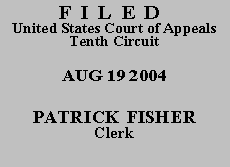

| MOHAMMED SALEH,
Plaintiff-Appellant, v. M. E. RAY, Warden, United States Penitentiary, Leavenworth; WALTER WOODS, Captain; UNITED STATES OF AMERICA; R. DARROW, Lieutenant, United States Penitentiary, Leavenworth, Defendants-Appellees. |
|
Plaintiff Mohammed Saleh, a federal prisoner appearing pro se, appeals the district court's dismissal of his civil rights complaint. Plaintiff filed suit against the United States and the individual defendants, all prison officials working at the United States Penitentiary in Leavenworth, Kansas, alleging they violated his First and Eighth Amendment constitutional rights by placing him in administrative detention because of his Muslim faith and using excessive force in placing him in ambulatory restraints.
The district court dismissed plaintiff's Eighth Amendment claims, finding no evidence in the record to suggest that plaintiff suffered any injury at all as a result of the restraints and that the placement of plaintiff in ambulatory restraints in order to quell a prison disturbance did not amount to cruel and unusual punishment. The district court dismissed plaintiff's First Amendment claims, finding that plaintiff had failed to articulate any interference with the practice of his Muslim beliefs or any evidence of religious retaliation. It also found nothing in the record tending to show that defendants' actions burdened the free exercise of plaintiff's religion in violation of Religious Freedom Restoration Act (RFRA). The district court also dismissed the claims against the United States and the defendants in their official capacities.
On appeal, plaintiff contends the district court erred in granting summary judgment without first allowing him to conduct discovery and in concluding his constitutional rights were not violated. We review the district court's grant of summary judgment de novo, applying the same standard as did the district court. Amro v. Boeing Co., 232 F.3d 790, 796 (10th Cir. 2000). We view the evidence and draw any inferences in the light most favorable to the party opposing summary judgment. See Anderson v. Liberty Lobby, Inc., 477 U.S. 242, 255 (1986). The nonmoving party must, however, identify sufficient evidence that would require submission of the case to the jury, and factual disputes about immaterial matters are irrelevant to a summary judgment determination. See id. at 248-49.
We affirm for substantially the same reasons set forth by the district court in its comprehensive and well-reasoned decision. The evidence, viewed in the light most favorable to the plaintiff, does not support a reasonable inference that he was subjected to unnecessary and wanton infliction of pain, see Whitley v. Albers, 475 U.S. 312, 320, 322 (1986), nor does it support any violation of his First Amendment or RFRA rights. Further, the district court did not abuse its discretion by deciding the summary judgment motion without first allowing plaintiff to complete discovery. Because defendants raised a qualified immunity defense, the district court properly stayed discovery while that defense was resolved. See Workman v. Jordan, 958 F.2d 332, 336 (10th Cir. 1992). Plaintiff failed to file an affidavit explaining his need for additional discovery, as required by Fed. R. Civ. P. 56(f), and his motion seeking to compel discovery never informed the district court with any specificity how additional information would help him oppose defendants' motion for summary judgment. See Ben Ezra, Weinstein & Co. v. Am. Online Inc., 206 F.3d 980, 987 (10th Cir. 2000) (holding that, under Rule 56(f), nonmoving party seeking additional discovery must demonstrate precisely how additional discovery will lead to a genuine issue of material fact); DiCesare v. Stuart, 12 F.3d 973, 979 (10th Cir. 1993) (holding that Rule 56(f) applies to pro se litigants).
The judgment of the district court is AFFIRMED.
Entered for the Court
Circuit Judge
*. This order and judgment is not binding precedent, except under the doctrines of law of the case, res judicata, and collateral estoppel. The court generally disfavors the citation of orders and judgments; nevertheless, an order and judgment may be cited under the terms and conditions of 10th Cir. R. 36.3.
2. The Honorable Robin J. Cauthron, Chief District Judge, United States District Court for the Western District of Oklahoma, sitting by designation.